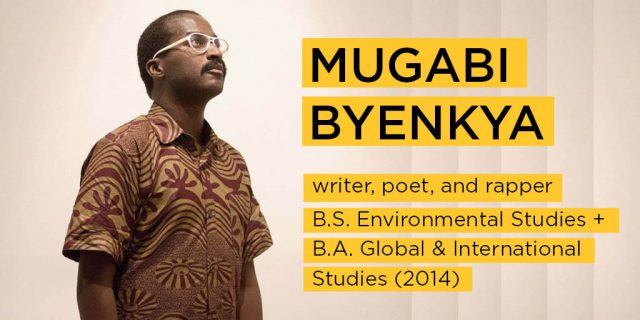
Why Mugabi’s a Hawk to Watch:
Life has a way of writing in unexpected plot twists. For KU grad Mugabi Byenkya, his journey to a career as a writer, poet and “occasional” rapper has been anything but predictable. Adapting to shifting circumstances, often brought on by debilitating bouts of chronic illness, has required equal amounts of personal determination and patience.
Born in Nigeria to Ugandan parents, after an initial childhood stroke Mugabi wasn’t expected to live past the age of 9. As a young adult, he arrived at KU with plans to pursue his passion of ecology and policy and eventually land a steady 9-to-5 job, plans that would change after a series of recurring health issues. But he soon found that the skills he developed during his time at KU were transferable to a new path. Now at 27 years old, he’s keeping a full schedule performing shows across five countries and promoting his recent book Dear Philomena, which has been distributed in five continents.
An all-around creative force, in addition to being a one-man-shop, operating as his own booking agency, publicist and manager, Mugabi was selected as one of ten emerging theater artists in bcHUB’s Emerging Artists Ensemble and named “one of 56 writers who has contributed to his native Uganda’s literary heritage in the 56 years since independence.” His award-winning writings have even been used to teach international high school English reading comprehension.
With many successes to his name in the face of lifelong challenges, Mugabi continues to defy expectations. And through his experiences, he’s learned to take things one day at a time, to set manageable goals, and, now more than ever, to be kind to himself.
Tell us in a sentence or two what you do for a living:
I’m a writer, poet and occasional rapper. Being an independent, proudly anti-establishment artist involves juggling a lot of hats, as I operate as my own booking agent, publicist and manager.
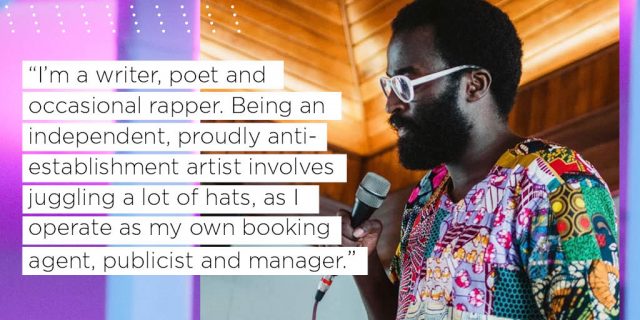
How did you end up doing what you do? Was there a certain moment when things came together? Or was it a longer journey?
Definitely a longer and still ongoing journey. I started writing privately at a very young age, and I always envisioned a future with a stable 9-5 full-time job, while pursuing my writing as a side hustle. I was able to attend KU through an incredibly generous full-tuition scholarship from the International Institute of Education. I felt internal pressure to gain a practical skill-set that could be leveraged into a sustainable career. Artistic careers are notorious for financial instability in the gig economy, so after two changes in my major, I declared at KU as an Environmental Studies and Global & International Studies double major. I intended to combine my passion for ecology with my love of policy and gain a practical skill-set that could be leveraged into secure, reliable, sustainable full-time employment.
My parents lived through three wars, and I’ve faced my fair share of instability: surviving a stroke and subsequent health complications in 2001, as well as the loss of my father and drastic change to my family’s economic stability in 2005. This taught me to prioritize stability, security and sustainability over everything. So, I worked hard and studied harder at KU, which brought me an additional scholarship from the Conservation Leaders for Tomorrow, four undergraduate research awards, and three amazing part-time jobs as an RA, DA and later Night Security with the Department of Student Housing. After four spectacular years, I graduated from KU in 2014, and moved to the University of Michigan for a Masters in Environmental Justice, partially funded by an Academic Leadership Fellowship. But “everything changed when the fire nation attacked!”
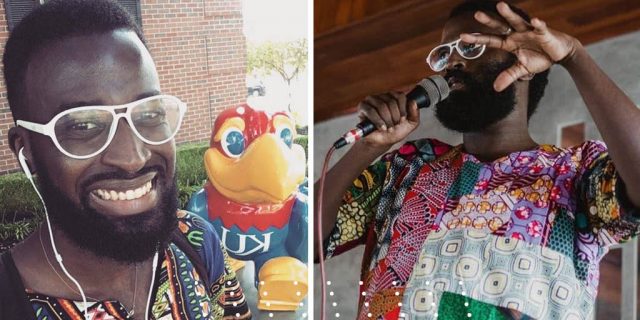
At the end of my first semester of graduate school, I suffered from two back-to-back strokes. The doctors told me I wouldn’t be alive to see 2016. With my impending death looming over my shoulder, I started writing Dear Philomena, as a last minute attempt to fulfill my dreams with the limited time I had left. Initially this was grueling; the exertion that 15 minutes of writing would entail on my body would result in an excruciating 3-hour long seizure. Over time, I built up the capability to write for longer and longer. This eventually led to me finding my current publisher and embarking on my current journey! The journey is far from over and managing my disabilities and chronic illnesses occupies the majority of my time.
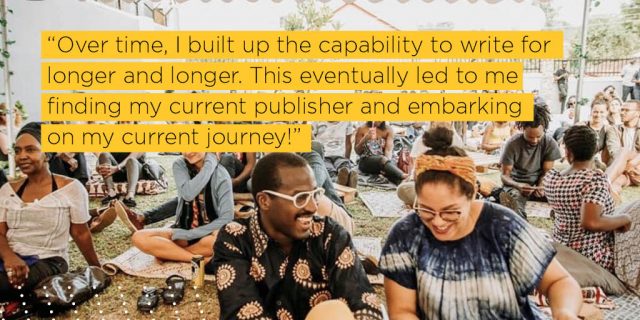
I’m currently partially dependent on my incredibly generous family and friends for food, shelter, and financial assistance, which I’m simultaneously humbled and incredibly grateful for. Despite my significant challenges, I’ve managed to survive several years past my intended life expectancy, distribute my book across North America, Asia, Africa, Antarctica and Australia, tour in support of my book, performing in 80 shows across 43 cities in five countries, and for that I am very proud.
What do you feel is your biggest achievement so far?
Tripling my intended life expectancy. I was supposed to die after my initial childhood stroke at 9 years old and I’m 27 currently!
What’s your lowest career moment and how did you pick yourself up and move on?
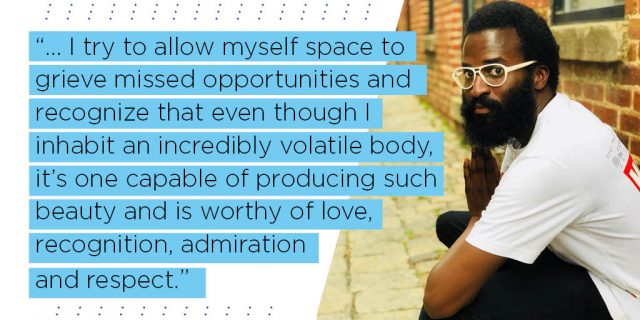
During the final leg of my book tour last year, I got hit by an unexplained extended bout of massively deteriorating health. I was supposed to have a 35 show, 20 city, six country tour. Instead, I was barely able to complete a 10 show, five city, three country mini-tour. These massive cancellations left me devastated and disappointed in my unreliable body. This was magnified by the barrage of racism and ableism I faced while dealing with doctors, promoters and show organizers. I was unable to properly process my feelings while struggling with partial paralysis, seizures, ridiculous amounts of pain and fatigue, among other chronic illness issues. Being chronically ill is a daily struggle and living in an ableist world is even worse. So, I try to allow myself space to grieve missed opportunities and recognize that even though I inhabit an incredibly volatile body, it’s one capable of producing such beauty and is worthy of love, recognition, admiration and respect.
Where do you hope to be in 10 years?
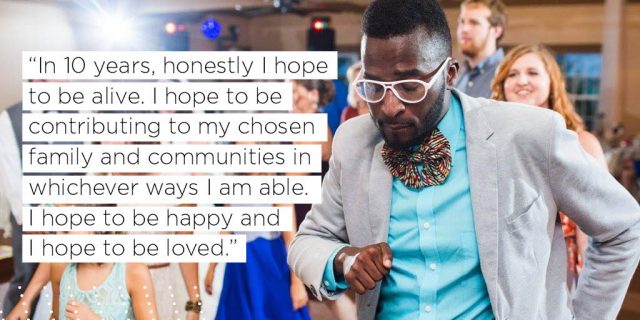
I used to be incredibly Type A and had my five-year plan charted out at any point in time. Life has since then laughed at my plans and thrown me for a loop, so I try not to be as rigid. In 10 years, honestly I hope to be alive. I hope to be contributing to my chosen family and communities in whichever ways I am able. I hope to be happy and I hope to be loved.
What do you know now that you wish you could tell your 18-year-old self?
I know that you perceive your mind as your biggest asset due to your disabled body and the ableism you have internalized. However, your mind is not your biggest asset, your heart is.
What’s your best career pro-tip?
My friend from KU, Alec Bostwick (@BostWiki on YouTube/Socials) made an incredibly poignant YouTube video a while back that outlined how to become successful in any career. I will re-iterate his advice because it’s the best career pro-tip I’ve heard. In the video he says, you need one of two things in order to become successful, namely:
1. Luck
2. Connections + Privilege
3. Hard work (OPTIONAL)
Hard work on its own gives you nothing. Some of the hardest working people I know consider themselves failures for things beyond their control. You can’t work your way out of miserable circumstances; everyone needs a helping hand. However, when hard work is paired with either luck and/or connections and privilege, you can move mountains. You can’t control luck, so folks should learn how to best leverage their respective privilege and make the right connections in order to succeed.
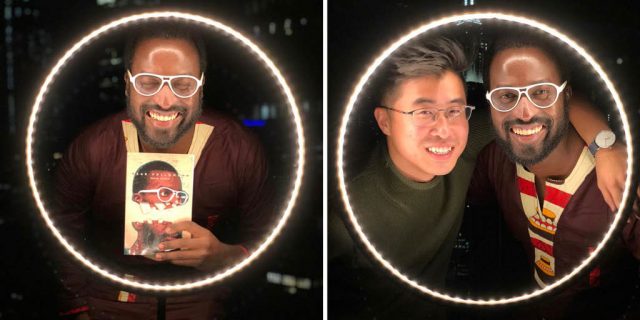
For example, while I was working on edits for Dear Philomena, my roommate’s older brother walked in and asked me what I was up to. When he found out I was editing a book I wrote, he recommended a friend of his wife’s. She had just recently founded her own independent small publishing house. I decided to learn from the mistakes of artists I knew and opted for a non-conventional independent contract, as this was my first book. I bought the rights for the book from my publisher and paid up-front for all publication costs. This was significantly more than I could afford, so I ran an incredibly successful Kickstarter campaign, which more than tripled my intended fundraising goal! Shortly after this success, I ended up with a terrible agent, who took a large chunk of my Kickstarter money and did next to nothing with it. This was when I made the decision to become my own manager/publicist/booking agent rather than outsource.
Currently, I have made significantly more than the typical advance and 5-10% royalty deal that most authors get. I’ve been able to leverage all I’ve learned as my own manager/publicist/booking agent in order to find folks able to actually contribute to my career.
How did your KU degree prepare you for your current job?
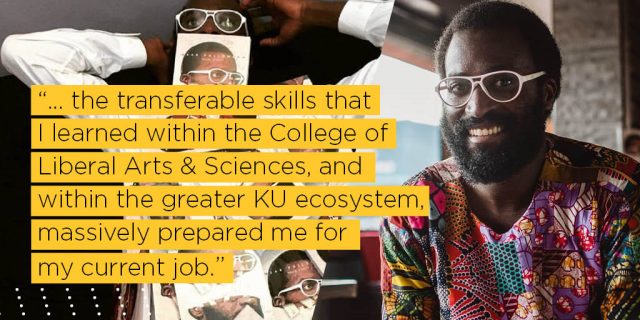
My degrees at KU directly prepared me for a very different job that I am no longer physically able to do. However, the transferable skills that I learned within the College of Liberal Arts & Sciences, and within the greater KU ecosystem, massively prepared me for my current job. While I was at KU, I had to juggle demanding classes, a part-time job, student organization involvement and relationships/life. Because I was a double major, I went from Chemistry to African Film to a Student Senate meeting in the same day. Similarly, in my current job, I can go from a TV interview to writing and publishing something new to a paid performance in the same day. My KU degrees not only taught me how to juggle many hats in different fields but also how to write for an audience effectively, efficiently digest large amounts of data, and present findings in an engaging unconventional manner.
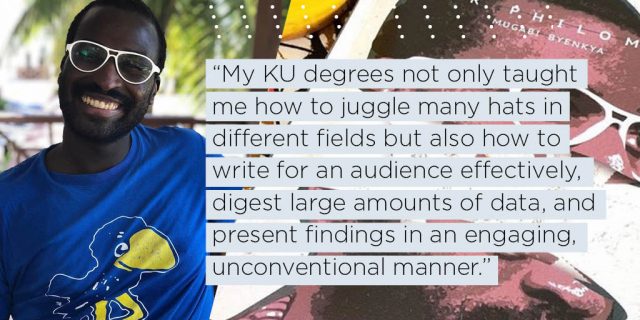
What do you do after you’ve clocked out?
I used to have a mantra when I was working on Dear Philomena: “#NoDaysOff.” Every day I would post my progress through a word count. This helped keep me accountable but also fostered an unhealthy work practice. I would feel incredibly guilty for being unable to write. Yet, I always had a valid and health-related reason for not writing.
Lately I’ve decided to prioritize rest and the privilege to be able to have “#DaysOff.” When I’ve clocked out I enjoy chai and conversation, live music, especially anytime I can catch my brother and his friends perform, and devouring our 5000+ comic book collection we’ve been accumulating since 1998!
What is a fun fact about you that surprises people?
I hate chocolate.
Be like Mugabi. Tell your story. For more information, visit the Center for Global and International Studies and Environmental Studies at the University of Kansas. Get the latest news from Mugabi on his website.
Hawks to Watch are disrupters. They’re poised for greatness, inspiring their colleagues and excelling in their professions. Basically, they’re killing it. Having recently graduated, they are just starting to leave their mark and we can’t wait to see how their story unfolds. These Jayhawks span all industries including business, non-profits, tech, healthcare, media, law and the arts.